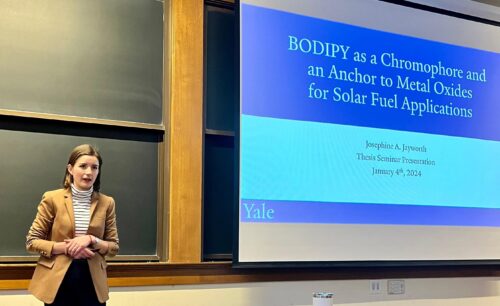A fluke in a chemistry experiment seven years ago led Josie Jayworth (GSAS ’24) to discover a new chemical anchoring group—one that would later become the foundation of her PhD thesis. Her work focused on the surface attachment of small molecules to metal oxides, exploring their potential application in solar-powered energy storage. Could this unexpected quirk pave the way for sun-charged fuel?
The answer, as it so often goes in research, turned out to be inconclusive. The big questions that Jayworth posed weren’t ones that could be answered overnight or even over a decade. A chemist who often says she thinks like an engineer, Jayworth felt an urgency to act more directly on the climate crisis.
“I really enjoyed the research I was doing, but it felt a few too many steps away from application for climate problems that I felt,” Jayworth said.
In the final year of her chemistry PhD, Jayworth began seeking out opportunities that felt closer to real-world impact. She found that opportunity at the Yale Center for Business and the Environment (CBEY), where she was introduced to her current role as an Environmental Innovation Fellow, jointly supported by CBEY and the Tsai Center for Innovative Thinking at Yale.
Now, Jayworth mentors students as they develop environmental innovation projects. These range from 3D-printed sustainable homes to oyster shells repurposed as water filtrates, and even a partnership with the David Geffen School of Drama at Yale to recycle and reuse set materials. For Jayworth, the shift from conducting research to helping others explore solutions was a natural evolution—one rooted in her desire for tangible progress.
Jayworth is no stranger to juggling multiple interests. As an undergraduate, she was both a chemist and a varsity long-distance runner. Today, she still runs regularly, is married to a cross-country coach, and serves as president of the New Haven Road Runners. Though many view marathons as solitary feats, she sees them as communal.
“I’m not a remarkably mentally tough person,” Jayworth said. “I think I’ve just been really lucky to be on a team here where my friends are all very similar in speed to me, and so we just get to run a lot together and chat. For me, it’s really such a social thing.”
Jayworth sees the same pattern in research. Though each scientist may work on their own project, collaboration is often what drives progress. She admits that in her current role, she sometimes misses the daily camaraderie of lab work or group runs. But she finds purpose in helping students chart their own paths toward climate solutions—and in supporting them through the early stages of uncertainty and ambition.
She believes change often begins with small individual actions that ripple outward. “As a vegetarian, I understand [that] myself alone, not eating meat doesn’t really matter,” Jayworth said. She noted that the growing number of people adopting plant-based diets has led to having more accessible options.
These small decisions—what we eat, how we travel, how we support sustainability—can snowball into broader shifts. At Yale, Jayworth helps students recognize not just their responsibility but their capacity to create change.
“It is the support staff’s job to keep students going, and also temper it a little bit so it doesn’t burn out immediately. Students come with all of their ideas and things that they want to accomplish,” Jayworth said. “I think that was really fun because it’s a cool experience to get to meet that excitement and work with them on climate solutions.”

